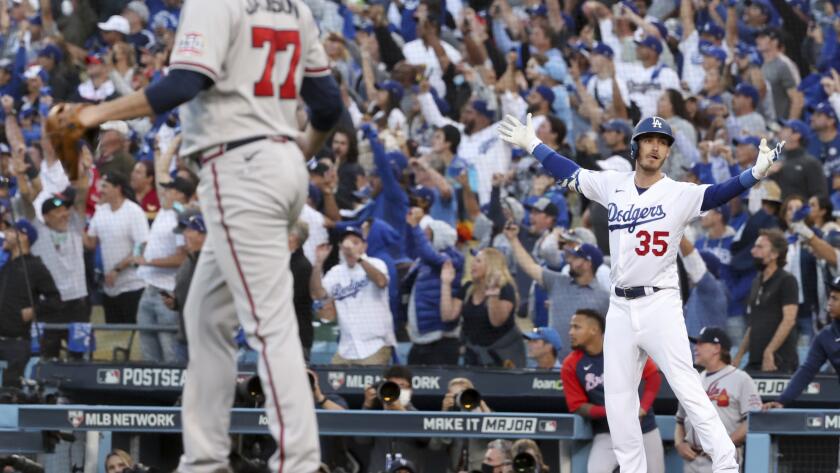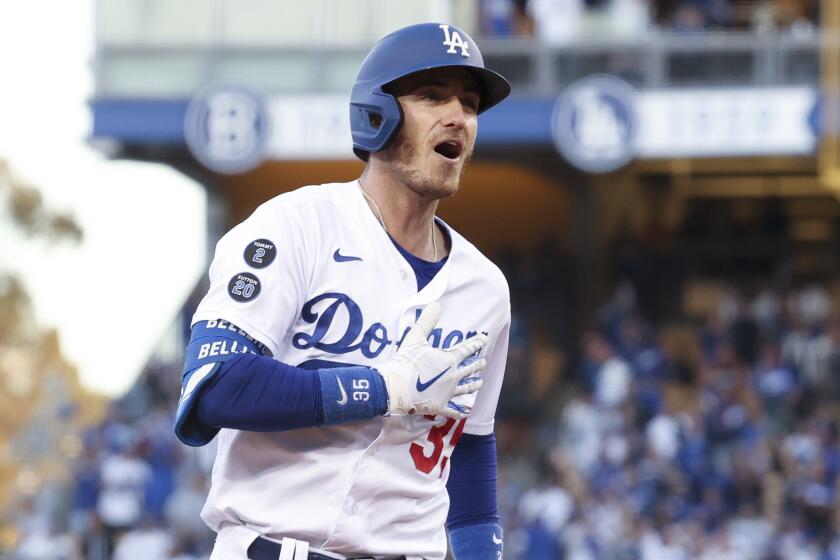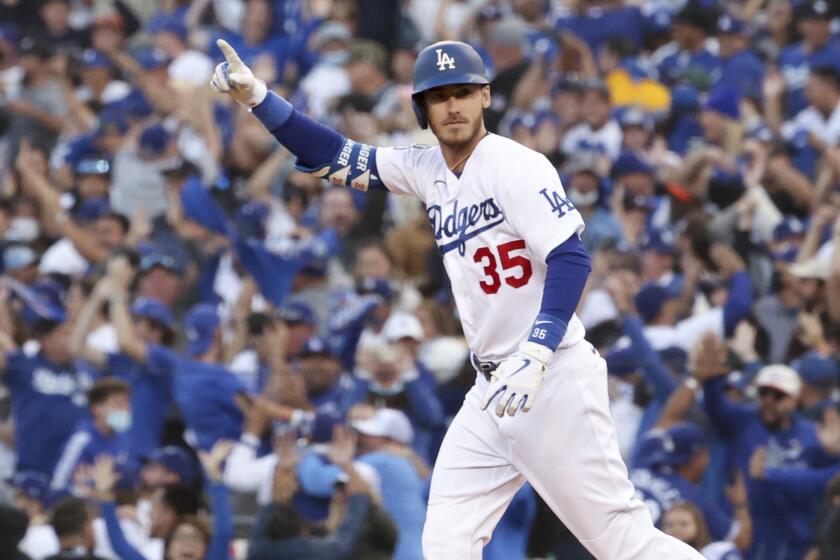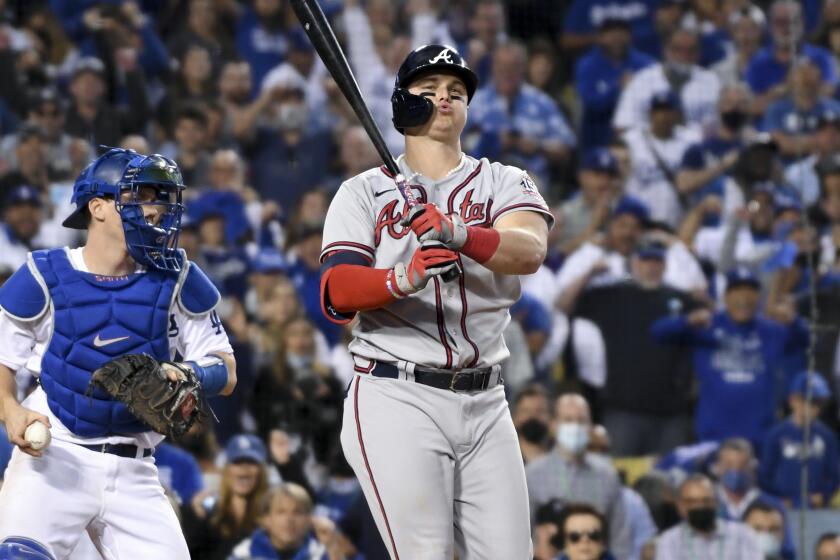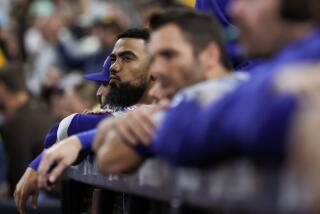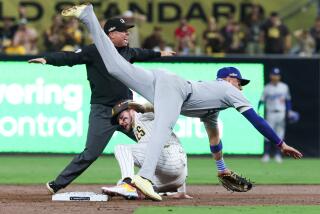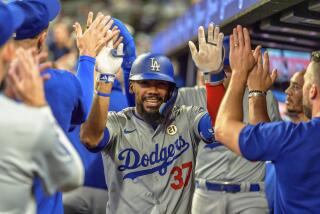Dodgers go from ‘dead in the water’ to season-saving Game 3 comeback win over Braves
Dodgers players Cody Bellinger and Mookie Betts and manager Dave Roberts discuss Bellinger’s game-tying home run against the Atlanta Braves in NLCS Game 3.
The course of the Dodgers’ season, five outs from a 3-0 ditch just one team has overcome in Major League Baseball history, changed in their 6-5 win Tuesday when Cody Bellinger decided to chase a fastball several inches above the strike zone.
By the time the baseball landed in the right-field pavilion for a game-tying, three-run home run in the eighth inning, the fans, those who stuck around to see Game 3 of the National League Championship Series through, were roaring to a decibel level few have ever experienced inside Dodger Stadium.
Bellinger hopped around first base, turned to face the Dodgers dugout across the diamond and swaggered around the bases. The swing, a tomahawk chop to the Atlanta Braves’ hearts, replenished the Dodgers’ World Series aspirations. The building shook. The Dodgers exhaled.
“We were dead in the water,” manager Dave Roberts said. “You could see it.”
Cody Bellinger, who drove in the series-clinching run against the Giants after a dreadful season at the plate, sparks the Dodgers to victory over the Braves.
The home run, as important as it was, didn’t win the Dodgers anything. The score still was tied. At least one more run was needed to win and cut the Braves’ series lead in half, by a club that had squandering scoring opportunities in October down to a science.
But these Dodgers are also a team that, when the offense awakens, routinely has ridden waves when the tide is high. So when Chris Taylor stroked the next pitch for a single off a rattled Luke Jackson, a trace of inevitability settled over Chavez Ravine.
It thickened when, after Jackson was pulled for Jesse Chavez, Taylor stole second base — for the Dodgers’ 13th steal in 13 tries this postseason — and advanced to third when Matt Beaty hit a groundball to second base that would’ve started an inning-ending double play had Taylor stayed put.
“CT’s obviously someone that is kind of like an unsung hero,” Dodgers right fielder Mookie Betts said. “Everybody needs a CT on their team.”
Taylor’s exploits gave Betts a chance. He didn’t waste time. The superstar cracked the first pitch he saw from Chavez, a 92-mph sinker, to the right-center-field gap. Taylor scored. Betts scampered to second base for a go-ahead double to complete the comeback. The ballpark rumbled again.
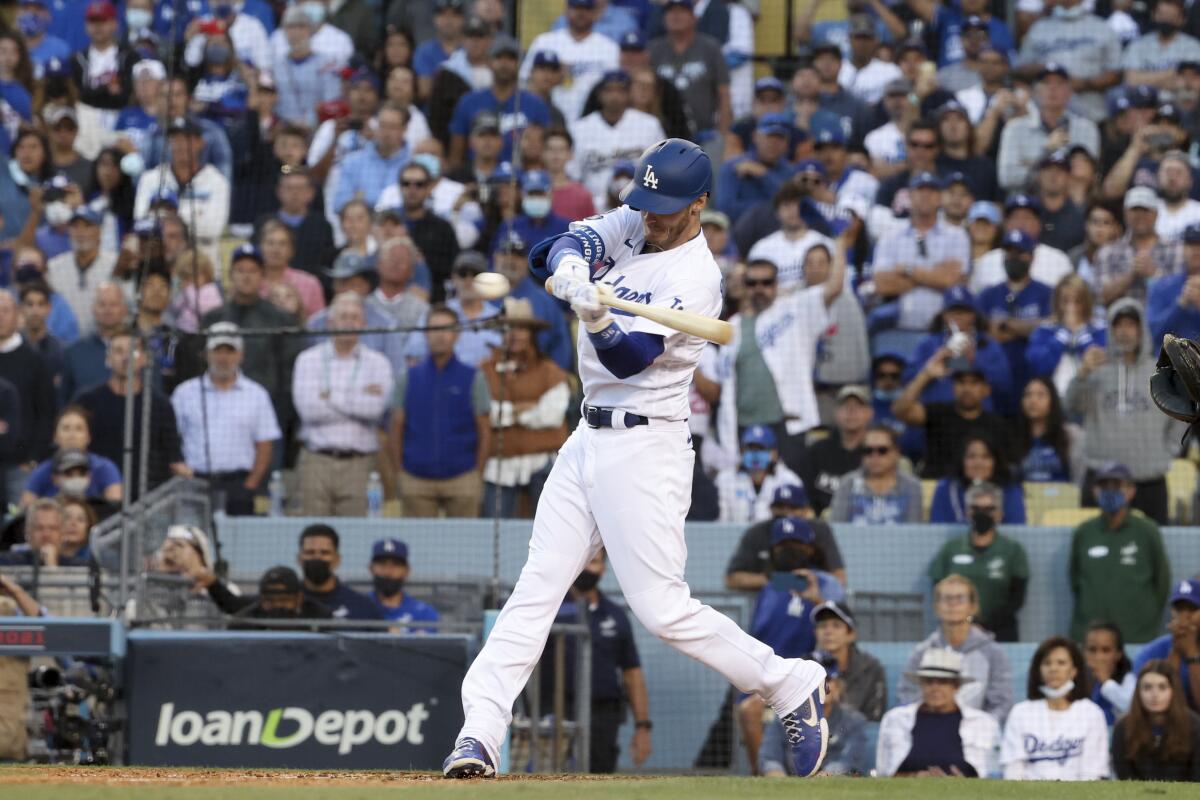
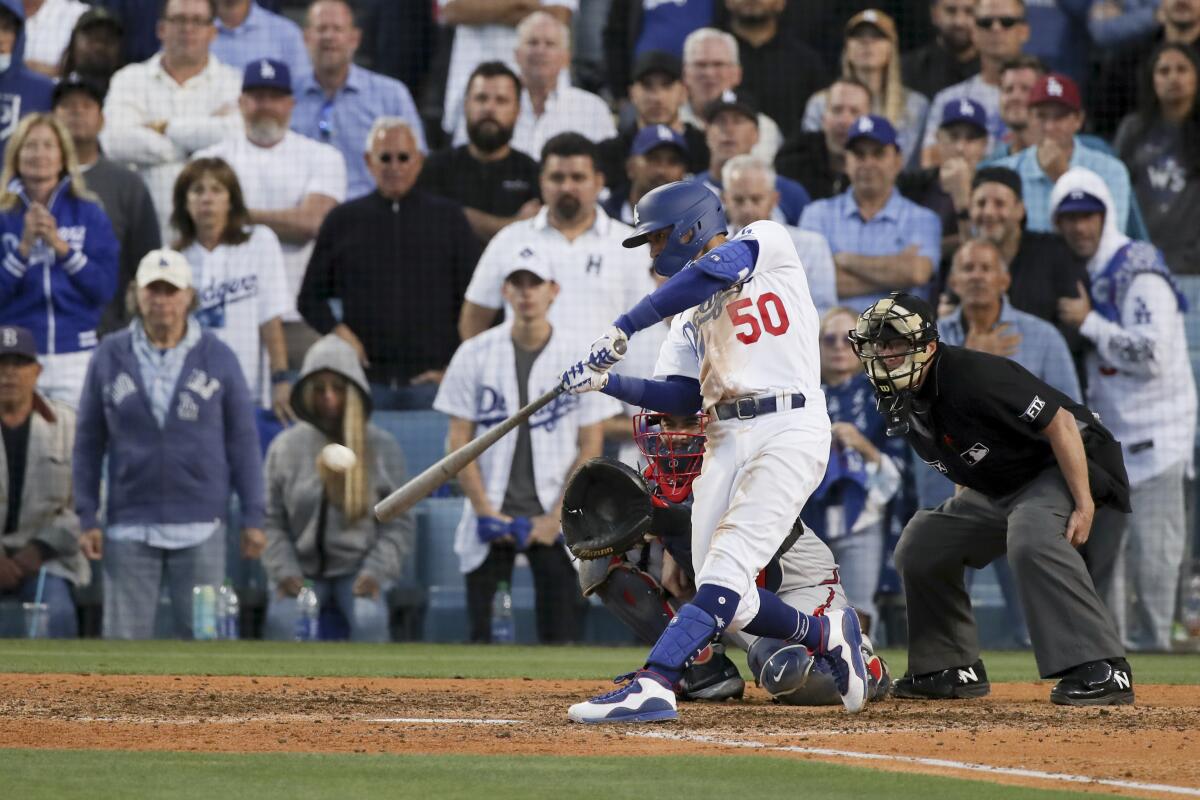
“It was as loud as I’ve ever heard Dodger Stadium,” Roberts said.
The Dodgers’ three hits with runners in scoring position in the inning exceeded their total from the series’ first 25 innings. With them, they scored more than four runs for just the third time in nine playoff games. It was the first time they have won a postseason game when trailing by three or more runs after the seventh inning. They had been 0-84.
As a result, after Kenley Jansen retired the side in order in the ninth inning, the Dodgers trail the Braves 2-1 in the NLCS for the second straight year. Last season they lost Game 4 before roaring back to go to the World Series. They’ll look to avoid a 3-1 hole in Game 4 on Wednesday.
Tuesday’s comeback was made possible by seven relievers holding the Braves to one run after Walker Buehler’s surprising early departure.
Buehler threw the game’s first pitch at 2:08 p.m., an abnormally early start for a postseason game, and quickly encountered turbulence. Eddie Rosario welcomed him with a single. Freddie Freeman pressed repeat for his first hit of the series after going 0 for 8 with seven strikeouts in the first two games.
Suddenly, the Braves were pounding on home plate’s door. Then, suddenly, they weren’t. Ozzie Albies followed with a line drive to center field that never appeared destined to find grass. Gavin Lux charged to catch the ball on the fly and found Rosario inexplicably approaching third base. Rosario, the Braves’ Game 2 hero, easily was doubled off. Buehler then struck out Austin Riley, wiggling free without damage.
The Dodgers’ season was on the verge of annihilation until Cody Bellinger and Mookie Betts delivered one of the greatest comebacks in franchise history.
Rosario’s blunder was a gift and, within moments, doubled as a possible turning point because starting pitcher Charlie Morton couldn’t find the strike zone in his first appearance in a playoff game at Dodger Stadium since he closed out Game 7 of the 2017 World Series for the Houston Astros.
The 37-year-old right-hander issued a walk to Betts to start his outing. Four pitches later, he hung a curveball to Corey Seager, who banged it to the batter’s eye over the wall in center field. It was Seager’s second two-run, first-inning homer in two games. It was the first time Morton had given up a home run on a curveball in his playoff career. He had thrown 400 before Seager’s blast.
Morton retired the next two Dodgers before command issues reappeared. He issued three straight walks to load the bases for Taylor. Morton was on the ropes. The Braves’ bullpen already was stirring. Taylor popped out to waste the chance.
Morton’s pitch count already was at 34 pitches. He was prime for an early exit, which would’ve been a debacle for the Braves ahead of a scheduled bullpen game in Game 4. An outburst against Morton could’ve effectively won the Dodgers two games. One never materialized.
The Dodgers went two for 13 with two walks against Morton after his fourth walk in the first inning. They had one runner reach scoring position — Betts singled and stole second base in the second inning. He was stranded there.
The momentum built in the first inning was dead by the fourth when the Dodgers fell apart.

Freeman began the Braves surge with another single to left field — his second of three Tuesday. Two batters later, Austin Riley drove a fly ball to the warning track in center field. Gavin Lux, making his 10th start in center as a major leaguer, had room along the wall but the ball bounced off his glove.
Freeman advanced to third base. Riley was generously given a double. Disaster was brewing for the Dodgers. Jerry Meals added some spice behind home plate. Buehler got ahead of Joc Pederson 0-and-2 when he tucked a cutter inside the strike zone. However, Meals called the pitch a ball. Buehler was incensed. He never rebounded.
Pederson, after smashing a home run in Game 2, continued haunting his former teammates with an RBI single. Next, Adam Duvall lofted a broken-bat single to tie the score. Buehler then walked Travis d’Arnaud on four pitches to load the bases for Dansby Swanson.
On the second pitch, Swanson smashed a 107-mph one-hopper to Seager at shortstop. Like how Game 2 ended, the ball bounced off Seager’s backhanded glove try and into the outfield for an RBI single.
The bases still were loaded with one out, forcing Braves manager Brian Snitker to make a decision: have Morton hit or replace him with a pinch-hitter knowing a bullpen game loomed Wednesday. He chose to have Morton hit. Morton struck out.
Rosario then worked a walk to score the Braves’ fourth run and chase Buehler from the shortest start of his already acclaimed postseason career. With Freeman up next, Roberts summoned left-hander Alex Vesia to pitch. An angry Buehler briskly walked off the field. He threw his cap and glove in the dugout before disappearing into the tunnel.
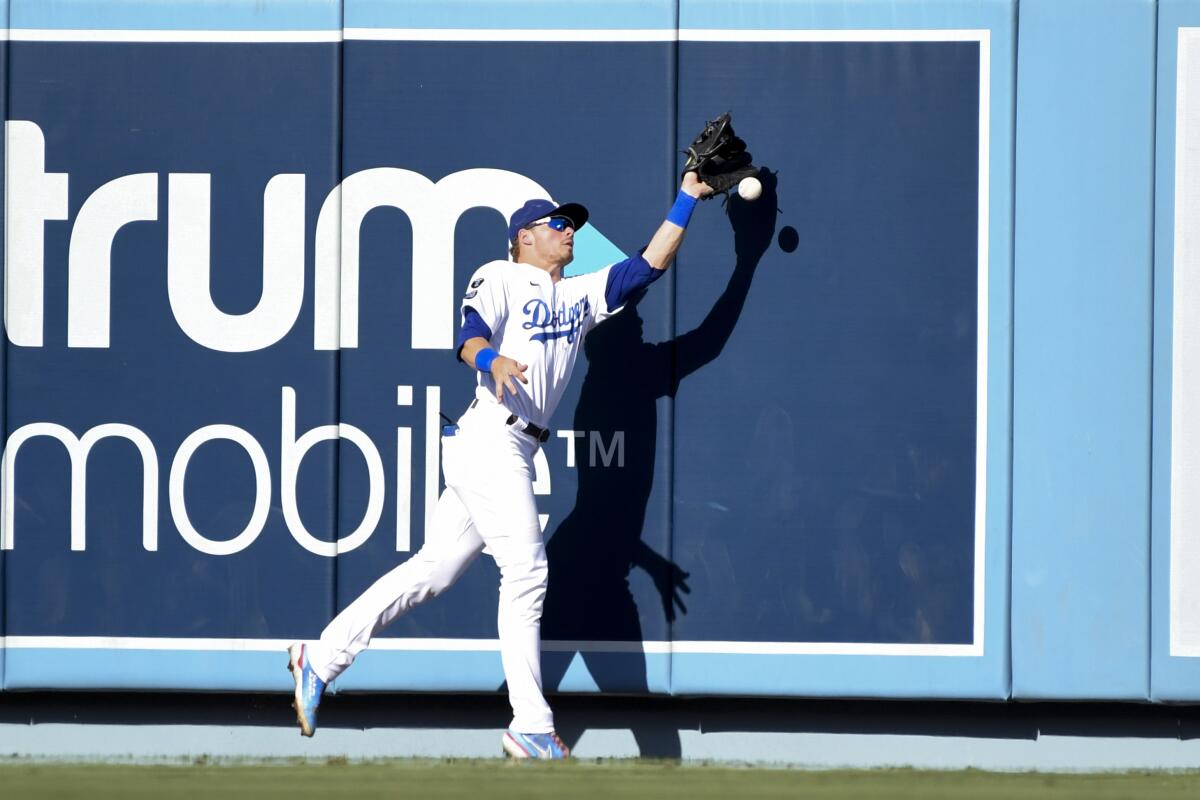
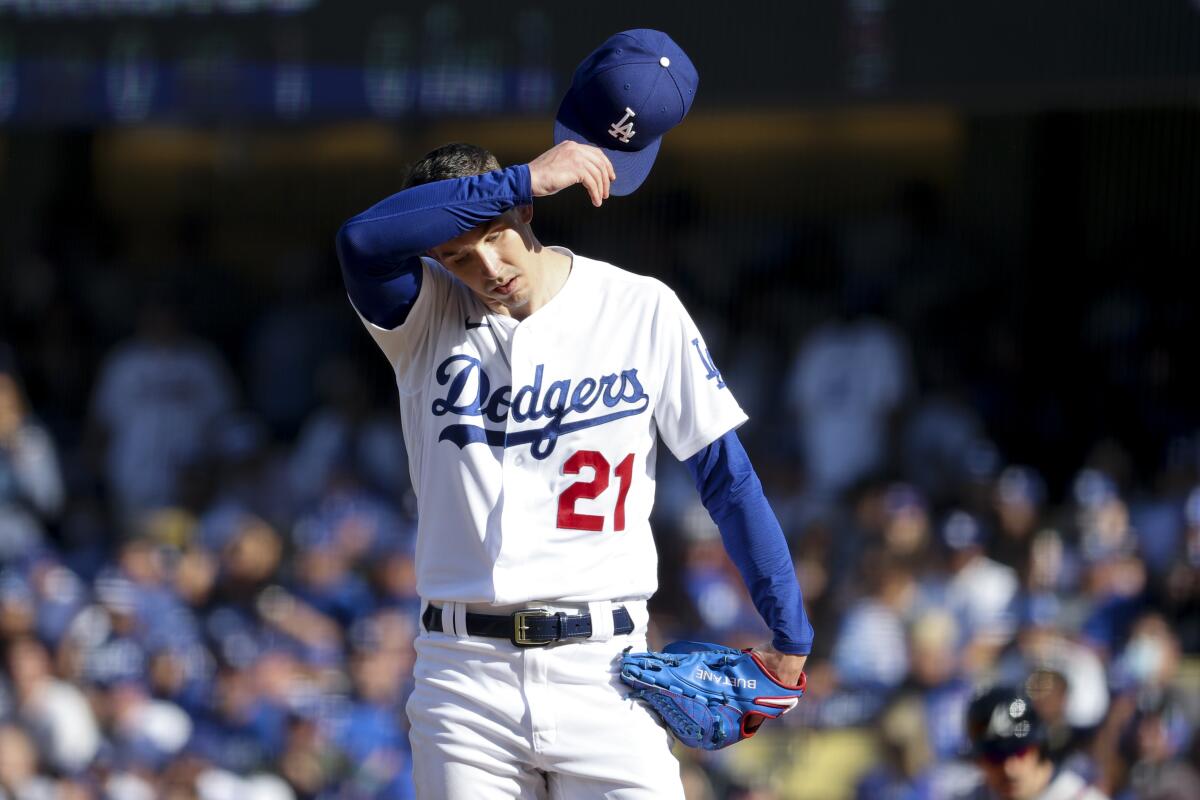
“There’s days where nothing seems to be working,” Buehler said.
Freeman flied out against Vesia to leave the bases loaded. The Braves tacked on a run in the fifth inning on a single from Duvall, but their inability to produce more in the fourth cost them.
The shadows by then were creeping onto the diamond and they aided the two bullpens in suppressing the offenses. For the Dodgers, it was reminiscent of Game 2 on Sunday when Seager hit a two-run home run in the first inning and the offense went silent until Taylor’s go-ahead, two-run double in the seventh inning.
Taylor’s hit wasn’t enough at Truist Park that night, and the Dodgers emerged facing a 2-0 hole. Tuesday was different. It took them an inning longer, after the shadows gave way to the stadium lights, to reignite the engines. When they turned on this time there was no looking back.
Atlanta’s Luke Jackson, who gave up a game-turning home run to Cody Bellinger, doesn’t consider the loss to be a ‘dagger’ to the Braves’ World Series hopes.
It started when Will Smith lined a single to right field against Jackson, the Braves’ most reliable reliever this season. Two batters later, AJ Pollock, who entered the game in the sixth inning, grounded a hit up the middle to breathe life into Dodger Stadium.
Bellinger fell behind 1-and-2 when Jackson chose to throw a second straight fastball. The first one was down the middle. Bellinger fouled it off. Jackson hit his target the second time. He wanted the fastball up and out of the strike zone. He wanted Bellinger to chase.
“Sad thing is I would do the same thing again,” Jackson said.
Out of his hand, Jackson explained, he thought it would just be a ball. He assumed he would get another chance. But Bellinger pounced and the Dodgers’ fate flipped with a swing.
More to Read
Are you a true-blue fan?
Get our Dodgers Dugout newsletter for insights, news and much more.
You may occasionally receive promotional content from the Los Angeles Times.
